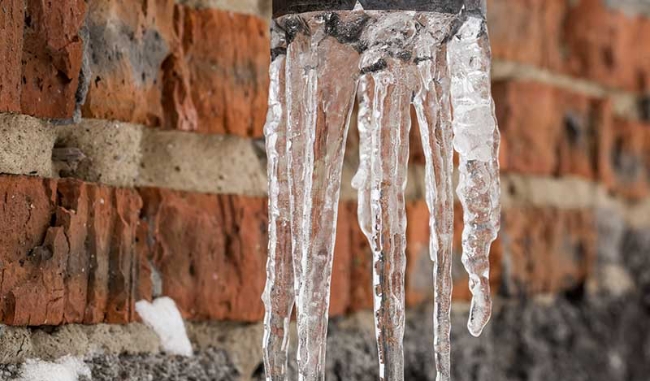We have uncovered this great article about Winter Plumbing Precautions: Preventing Frozen Pipes down the page on the internet and think it made good sense to relate it with you on this page.

Winter can wreak havoc on your pipes, particularly by freezing pipes. Below's how to avoid it from taking place and what to do if it does.
Introduction
As temperatures decline, the threat of frozen pipes boosts, possibly leading to costly repair services and water damages. Recognizing how to prevent frozen pipes is important for house owners in cool environments.
Recognizing Icy Pipelines
What creates pipelines to freeze?
Pipes freeze when exposed to temperature levels listed below 32 ° F (0 ° C) for prolonged periods. As water inside the pipes ices up, it expands, putting pressure on the pipe walls and potentially triggering them to break.
Threats and problems
Icy pipelines can lead to water system interruptions, residential or commercial property damage, and pricey fixings. Ruptured pipelines can flooding homes and trigger comprehensive structural damage.
Indications of Frozen Pipes
Determining icy pipes early can avoid them from breaking.
How to determine icy pipes
Search for reduced water circulation from faucets, uncommon smells or noises from pipelines, and noticeable frost on exposed pipes.
Avoidance Tips
Protecting vulnerable pipes
Cover pipes in insulation sleeves or make use of heat tape to secure them from freezing temperature levels. Focus on pipelines in unheated or external areas of the home.
Heating methods
Maintain indoor rooms effectively warmed, especially locations with pipes. Open up closet doors to permit cozy air to flow around pipelines under sinks.
Shielding Exterior Pipes
Garden hose pipes and outdoor faucets
Separate and drain pipes yard pipes prior to winter months. Set up frost-proof faucets or cover exterior faucets with protected caps.
What to Do If Your Pipes Freeze
Immediate actions to take
If you suspect icy pipelines, keep faucets open up to ease stress as the ice melts. Utilize a hairdryer or towels taken in hot water to thaw pipes slowly.
Long-Term Solutions
Structural modifications
Take into consideration rerouting pipelines far from outside wall surfaces or unheated locations. Include added insulation to attic rooms, cellars, and crawl spaces.
Updating insulation
Invest in premium insulation for pipes, attic rooms, and wall surfaces. Proper insulation aids preserve constant temperatures and lowers the threat of frozen pipes.
Verdict
Preventing frozen pipelines calls for proactive steps and quick actions. By recognizing the reasons, indicators, and safety nets, homeowners can safeguard their plumbing throughout cold weather.
Helpful Tips to Prevent Frozen Pipes this Winter
UNDERSTANDING THE BASICS: WHY PIPES FREEZE AND WHY IT’S A PROBLEM
Water freezing inside pipes is common during the winter months, but understanding why pipes freeze, and the potential problems it can cause is crucial in preventing such incidents. This section will delve into the basics of why pipes freeze and the associated problems that may arise.
THE SCIENCE BEHIND FROZEN PIPES
When water reaches freezing temperatures, it undergoes a physical transformation and solidifies into ice. This expansion of water as it freezes is the primary reason pipes can burst. As the water inside the pipe freezes, it expands, creating immense pressure on the walls. If the pressure becomes too great, the pipe can crack or rupture, leading to leaks and water damage.
FACTORS THAT CONTRIBUTE TO PIPE FREEZING
- Low Temperatures: Extremely cold weather, especially below freezing, increases the risk of pipes freezing.
- Uninsulated or Poorly Insulated Pipes: Pipes located in unheated areas, such as basements, crawl spaces, or attics, are more prone to freezing. Insufficient insulation or lack of insulation altogether exacerbates the problem.
- Exterior Wall Exposure: Pipes running along exterior walls are susceptible to freezing as they encounter colder temperatures outside.
- Lack of Heating or Temperature Regulation: Inadequate heating or inconsistent temperature control in your home can contribute to frozen pipes.
PROBLEMS CAUSED BY FROZEN PIPES
WHY CERTAIN PIPES ARE MORE PRONE TO FREEZING
- Pipe Bursting: As mentioned earlier, the expansion of water as it freezes can cause pipes to burst, resulting in significant water damage.
- Water Damage: When pipes burst, it can lead to flooding and water damage to your property, including walls, ceilings, flooring, and personal belongings.
- Structural Damage: Prolonged exposure to water from burst pipes can compromise the structural integrity of your home, leading to costly repairs.
- Mold and Mildew Growth: Excess moisture from water damage can create a favorable environment for mold and mildew growth, posing health risks to occupants.
- Disrupted Water Supply: Frozen pipes can also result in a complete or partial loss of water supply until the issue is resolved.
https://busybusy.com/blog/helpful-tips-to-prevent-frozen-pipes-this-winter/
- Location: Pipes located in unheated or poorly insulated areas, such as basements, crawl spaces, attics, or exterior walls, are at higher risk of freezing.
- Exterior Pipes: Outdoor pipes, such as those used for irrigation or exposed plumbing, are particularly vulnerable to freezing as they are directly exposed to the elements.
- Supply Lines: Pipes that carry water from the main water supply into your home, including the main water line, are critical to protect as freezing in these lines can affect your entire plumbing system.
- Underground Pipes: Pipes buried underground, such as those connected to sprinkler systems or outdoor faucets, can be susceptible to freezing if not properly insulated.

I'm certainly very drawn to Helpful Tips to Prevent Frozen Pipes this Winter and I'm hoping you liked my article. For those who liked our blog post if you please don't forget to share it. Thanks for being here. Revisit us soon.
Request A Quote
Comments on “Ways to Defend Your Pipes from Cold Weather: Expert Advice”